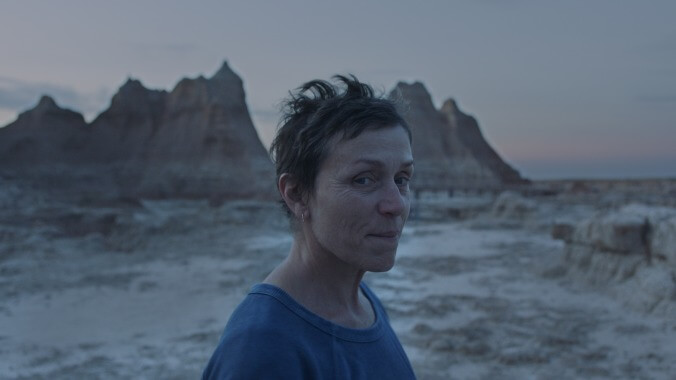Frances McDormand finds a new life on the road in the sublime Nomadland


Unless the political landscape changes significantly over the next few years, the number of Americans facing an old age like the one profiled in Nomadland will only continue to grow. A longtime resident of Empire, Nevada, Fern (Frances McDormand) watched her town shrivel up and die after the gypsum mine that employed the majority of the community shut down in January 2011. A dandelion seed left to float on the fickle winds of capitalism, Fern now lives in a custom van she calls “Vanguard,” traveling in search of temporary employment and a safe place to park overnight. In the winter, she packs boxes at an Amazon warehouse; in the summer, she fries burgers and cleans toilets at tourist attractions. Her pleasures are simple, her struggles immense. Her hair is short, her shoes sensible. She keeps moving so she doesn’t dwell on the past for long.
In different hands, Fern’s story might be tragic. But while Nomadland director (and writer and editor and co-producer) Chloé Zhao is interested in the material realities of a sixtysomething widow living an itinerant lifestyle, she also brings a dignity to the film that verges on sublime. Zhao’s signatures as a filmmaker (so far, anyway—she’s currently working on Eternals for Marvel) are similar to those of the Italian neorealists: nonprofessional actors, humble milieus, and unadorned, character-driven drama. Fern is a fictional character, but Empire is a real place, and much of the film’s cast, including three sage mentors who all teach Fern something about life, is filled up with actual, self-proclaimed “nomads,” in the same way that Zhao’s The Rider cast actual rodeo cowboys as themselves. Zhao, McDormand, and the 24-person crew lived out of vans while filming Nomadland, following the workers first profiled in journalist Jessica Bruder’s 2017 book across seven states over five months.
Beijing-born Zhao’s relationship with the American West is romantic, even spiritual, and she shoots in color—sometimes overcast, sometimes luminous—that lends a starkly beautiful cowboy poetry to the campgrounds and wilderness areas where Fern makes her home. The upside of this rootless lifestyle is the opportunity to spend unhurried time in nature, and Zhao and cinematographer Joshua James Richards (God’s Own Country) capture the soft orange light of clouds at sunset and the inky green of conifers with a hushed reverence that suggests the healing strength Fern derives from being alone. She has friendships, and maybe something more with fellow traveler Dave (a wonderfully understated David Strathairn), if she wanted it. But the relationships among the nomads also drift with the seasons, much like the shifting light that inspired Ludovico Einaudi’s affecting piano score.
As we ride along with Fern and hear her story, as well as those of her companions, Nomadland subtly changes its focus from working-class solidarity and the commercial spaces that pass for community in 21st-century America to a more ephemeral theme: the leaving and the left. Several times throughout the film, Zhao frames a wide shot of a vehicle driving away into a stunning natural vista as Fern stands in the foreground and watches it depart, bearing lone witness to the driver and their journey. In fact, “bearing witness” is a phrase that applies both to Fern—a character who listens more than she talks—and the film itself. One particularly poignant scene finds the camera inspecting the canyons and valleys on real-life wanderer Charlene Swankie’s face as she tells Fern her plans for one last road trip to Alaska, where she plans to die; later on, a group of friends throws rocks into a campfire in her honor. “We never say goodbye,” insists Bob Wells, whose YouTube channel about RV living has more than 450,000 subscribers. “We say, ‘see you down the road.’”
McDormand was the one who originally optioned Bruder’s book for the screen, and the two-time Oscar winner internalizes the joys and sorrows of life on the road for a performance that’s vulnerable and melancholy while also suggesting an overwhelming gratitude for being alive. At first, Fern is reticent as she adjusts to her new lifestyle, sequestering her sorrows behind a stiff but friendly smile. Like many working Americans, she doesn’t like to take charity or wallow in self-pity. Early on, the daughter of an old acquaintance innocently inquires if she’s homeless. “I’m just houseless,” she replies. When asked if she’s married, she says she is, “But my husband died.” It’s not until much later in the film that we learn the undertow of restlessness that flows beneath Fern’s character, adding nuance to what might otherwise be a pitiable tale. All the while, McDormand observes quietly, letting her flatfooted stance and mischievous eyebrows do much of the expressive work.
Nomadland is, in some ways, a condemnation of a system that rewards decades of corporate loyalty with poverty and insecurity. But it’s also remarkably clear-eyed and honest about the pleasures and benefits of life on the road, its blend of documentary and fiction allowing those on the margins to tell their stories on their own terms. What results is a nuanced portrait of free spirits who reject a culture that has rejected them. If we see more of the dignified perseverance and hard-won wisdom than the desperate struggle… well, Zhao’s infatuation with the road is no secret, so it follows that she’d romanticize her subjects to some extent as well. Should anyone be forced to live like this? Of course not. But people do, and some have found a certain liberty in the lifestyle. Nomadland sits at their feet and lets them talk for a while.